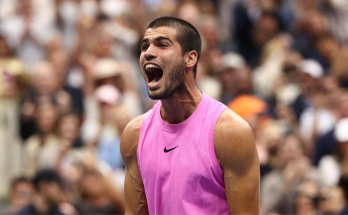Behind the Crease: Connor McDavid’s Oilers Turn to Blackhawks After Missed Canucks Trade Signals Urgency in Net
The Edmonton Oilers have been knocking on the door of greatness for years. With Connor McDavid and Leon Draisaitl leading the way, Edmonton has had the firepower to dominate in the regular season and the talent to push deep into the playoffs. Yet, despite all that promise, a single problem has continued to haunt them year after year: goaltending. And now, in a dramatic twist that reflects both desperation and precision, the Oilers are shifting their trade focus to the Chicago Blackhawks after failing to land a crucial goalie from the Vancouver Canucks. What started as another subtle move in a long off-season has erupted into a storyline that could define the franchise’s next chapter — or its most painful collapse.
The Oilers’ failed attempt to secure a deal with the Canucks marks more than a missed opportunity. It’s a signal flare to the rest of the league that Edmonton, a team burdened with sky-high expectations and an ever-closing championship window, is now actively and urgently searching for a solution in goal. And their attention turning toward the Blackhawks may be the clearest indication yet that GM Ken Holland and his staff are prepared to do whatever it takes — however unconventional — to find the missing piece before another postseason opportunity slips through their fingers.
Edmonton’s goaltending has not been disastrous in a traditional sense, but it has been inconsistent. Stuart Skinner showed flashes of brilliance over the past two seasons, and veteran backup Calvin Pickard did his part when called upon. But in the high-stakes cauldron of the Stanley Cup Playoffs, “good enough” in the crease is never actually good enough. In both of their most recent playoff runs, the Oilers ran into the same wall: they couldn’t rely on their goaltending in the moments that mattered most. It wasn’t that Skinner or Pickard were solely to blame — the defensive core had its holes, and Edmonton was too top-heavy at times. But as game after game tilted on a soft goal or a momentum-killing rebound, the reality became undeniable.
Connor McDavid has carried the weight of this franchise on his back for nearly a decade. He has won scoring titles, MVPs, and delivered highlight reels that define the modern era of hockey. But even McDavid, with all of his brilliance, cannot be the team’s goalie. The look on his face after another Game 6 or Game 7 loss tells you everything: the Oilers are out of time for half measures. They need stability in goal — not tomorrow, not next season, but now.
The attempt to pry a goaltender from Vancouver was bold, and by all accounts, the Oilers were ready to meet most of the Canucks’ asking price. The target was reportedly Arturs Silovs, a young netminder who had impressed in short NHL stints and international play. Silovs would have brought youth, agility, and the potential for long-term growth. But Vancouver balked. The Canucks, possibly wary of strengthening a Western Conference rival or unsure about giving up a promising piece, walked away. That failure left Edmonton staring down the barrel of an unresolved issue, one that now threatens to derail what should be their golden era.
That’s when the Blackhawks entered the picture.
Chicago is in the early stages of a rebuild, bolstered by the arrival of generational talent Connor Bedard and an eye toward the future. They are not expected to contend for several years, which makes their depth in goaltending all the more intriguing to teams like Edmonton. The Blackhawks have gathered a few assets in the crease — some veterans, some prospects, and a couple of fringe NHLers capable of stepping into more prominent roles. For a team like Edmonton, starved for consistency and desperate to stabilize their net, the Blackhawks offer a treasure chest of possibilities. It’s the classic win-now versus build-later trade dynamic that has defined so many deadline blockbusters in the past.
The name drawing the most attention is Arvid Söderblom. At 25, the Swedish goaltender has shown glimpses of high-level talent and seems ready for a larger role in the NHL. While not yet a proven starter, Söderblom fits the mold of a breakout candidate: technically sound, mentally composed, and unshaken by poor stretches of play. For Edmonton, who needs more than a quick fix, he might offer both short-term help and long-term value. The Oilers aren’t just shopping for a rental; they’re looking for a goaltender who can grow with the team while stabilizing the present.
Another intriguing option is Petr Mrázek, the veteran who has bounced between teams and seems perennially undervalued. Mrázek’s best years may be behind him, but he brings postseason experience, a competitive edge, and a “gamer” mentality that the Oilers could benefit from. While he wouldn’t be a permanent solution, he could offer Edmonton a bridge until a younger goalie is ready to take over. However, concerns about his durability and consistency remain, and Oilers management must weigh the risk of relying on a goaltender whose career has been defined by flashes of brilliance followed by frustrating injuries.
Regardless of who the Oilers ultimately target, the shift to Chicago underscores the gravity of the moment. McDavid and Draisaitl aren’t going to be in their prime forever. With both players already having logged considerable playoff miles — and with whispers of their long-term future in Edmonton growing louder with each postseason exit — the Oilers are under immense pressure to deliver. Another season of “almost” or “what if” simply isn’t acceptable. And this time, management knows it.
This trade deadline is no longer about adding depth or insurance. It’s about sending a message to the locker room, the fan base, and the hockey world that the Oilers are done playing it safe. They are no longer interested in weathering criticism for aggressive trades or paying a premium for quality. The calculus has changed. The value of a deep playoff run, or better yet, a Stanley Cup Final victory, outweighs the risk of losing a prospect or draft pick that might pan out years down the line. Edmonton isn’t chasing potential — they’re chasing a parade.
The failed trade with Vancouver serves as both a cautionary tale and a wake-up call. The Oilers cannot afford to walk away from another negotiation empty-handed. With teams like Colorado, Dallas, and Vegas looming large in the Western Conference, goaltending will be the difference between surviving and dominating. A big save in the final minute. A shutout to steal a road game. A goaltender who doesn’t just fill a position but becomes a pillar. That’s what Edmonton is looking for, and they believe Chicago might just hold the answer.
There is, of course, no guarantee. Trades carry risk, and every fan in Edmonton knows how often this franchise has been burned by ambition. But in this case, the risk of not acting is far greater. Connor McDavid deserves more than another season of putting up 120 points and watching it end in heartbreak. Leon Draisaitl, a force unto himself, should not be carrying both ends of the ice while praying for saves that never come. The time to act is now.
The Oilers’ pivot to Chicago isn’t a headline about backup plans — it’s a desperate leap toward salvation. And it may be the boldest, most defining move of Ken Holland’s tenure. Should it fail, the criticism will be fierce. But should it succeed, should Edmonton finally find stability in the blue paint, history may look back on this as the trade that saved the McDavid era.
For now, the phones are ringing. The scouts are watching. And the future of the Edmonton Oilers hangs in the balance.



